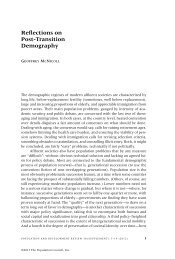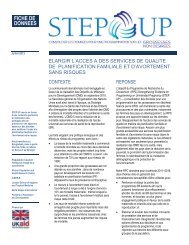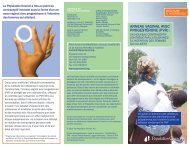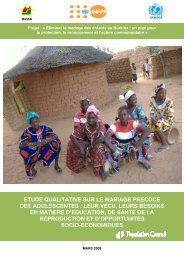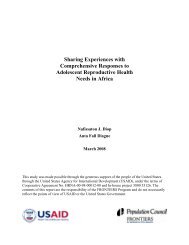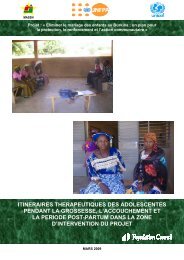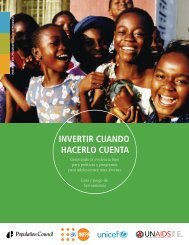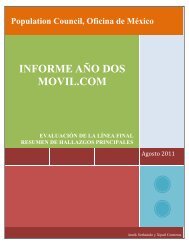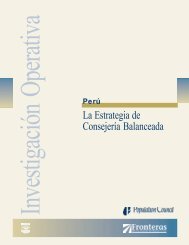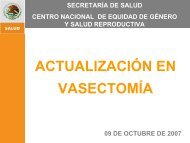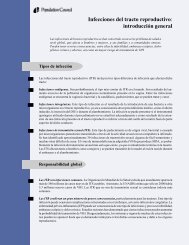Community Health Volunteer's Training Manual - Population Council
Community Health Volunteer's Training Manual - Population Council
Community Health Volunteer's Training Manual - Population Council
You also want an ePaper? Increase the reach of your titles
YUMPU automatically turns print PDFs into web optimized ePapers that Google loves.
Module 4 The work of <strong>Community</strong> <strong>Health</strong> Volunteers<br />
Topic 2 Hand washing<br />
Figure 4.2.1 How clean are your<br />
hands? Asks Dr. Amoussou,<br />
DDHS, AOB<br />
194<br />
Hand washing is a simple habit that can help you to stay healthy.<br />
In fact, many diseases such as diarrhoea, typhoid, worms and chest<br />
infection can be reduced significantly by washing your hands<br />
frequently. How does hand washing prevent the transmission of<br />
these diseases? Throughout the day germs collect on your hands<br />
if you do not wash them. You collect germs through handshake,<br />
touching contaminated surfaces, cleaning yourself after visiting the<br />
toilet, as well as touching food, animals and animal waste. If you do<br />
not wash your hands frequently, you transfer these germs from your<br />
hand to your mouth when you eat or to your eyes and nose when you<br />
touch them. Also, you may infect other people either by touching<br />
them directly or indirectly through objects such as the door handle.<br />
When should you wash your hands?<br />
•<br />
•<br />
Hand washing is the single most effective way to prevent the<br />
spread of diseases<br />
It is good to wash one’s hands as often as possible. However, there are times when it’s critical<br />
to wash your hands to limit the transfer of bacteria, viruses and other micro organisms. Box<br />
4.2.2 gives you examples of when to wash one’s hands.<br />
Box 4.2.2: When to wash one’s hands<br />
Before…..<br />
Preparing food<br />
Eating<br />
Treating wounds or cuts<br />
Touching sick or injured person<br />
Feeding children<br />
Preparing ORS<br />
Giving medication<br />
After…….<br />
Preparing food<br />
Eating<br />
Treating wounds or cuts<br />
Touching sick or injured person<br />
Using the toilet<br />
Touching animals or animal waste<br />
Blowing your nose<br />
Handling refuse or garbage<br />
Changing the child’s napkin<br />
After coughing or sneezing into your hands<br />
NB: For health volunteers, it is also important to wash your hands;<br />
Before preparing ORS<br />
After retreatment of an ITN



